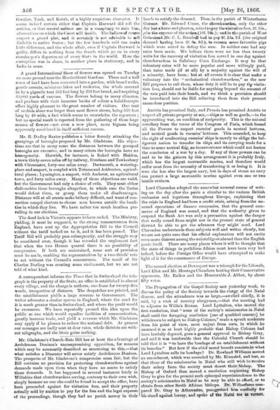Mr. Gladstone's Church-Rate Bill has at least the advantage of
Archdeacon Denison's uncompromising opposition, for reasons which may be summarily described as amounting to this,.—that what satisfies a Dissenter will never satisfy Archdeacon Denison. The prospects of Mr. Gladstone's compromise seem fair, but the Bill contains no provision for protecting churchwardens against demands made upon them when they have no assets to satisfy those demands. It has happened in several instances lately in Wiltshire that churchwardens serving, contrary to their own wish, simply because no one else could be found to accept the office, have been proceeded against for visitation fees, and their property actually sold by auction to pay for the fees and the legal expense of the proceedings, though they had no parish money in their
1 hands to satisfy the demand. Thus, in the parish of Winterborne Gunner, Mr. Edward Cusse, the pitureinvardeg, only the other day lost a horse and phaeton, seized foray thevieitation fees, 2/. 15s., pies the expense of the actin. (104 19a.); and in the parish of West Gritostead Mr. C. L. RumboIl had to pay 9/. 13s. 7d. (the original deman 1 haying been 3/. Os. 3d.), be ransom some favourite pigs which were seized to defray the sum. In neither case had any rates been male. We believe there were no less than twenty writs for the recovery of visitation fees served in one day against churchwardens in Salisbury Corn Exchange. It m.ty be that voluntary rates will be more popular and more willingly paid, than rates made (if at all) by a majority against the will of a minority, have been ; but at all events it is clear that under a voluntary rate the "ecclesiastical churchwardens," as the new Bill proposes to call them, whose duty it will be to pay flip visita- tion fees, should not be liable for anything beyond the amount of the rate paid into their hands, and we think a provision should be introduced into the Bill relieving them from their present anomalous position.






























 Previous page
Previous page